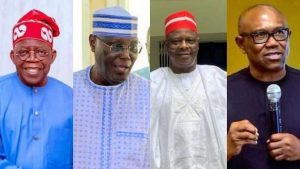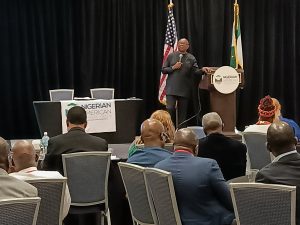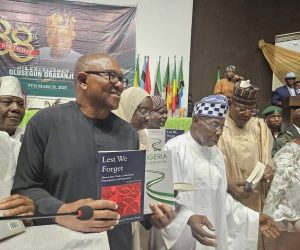Buhari’s focus on war against corruption will hamper economic progress — Ex-CBN Deputy Gov.
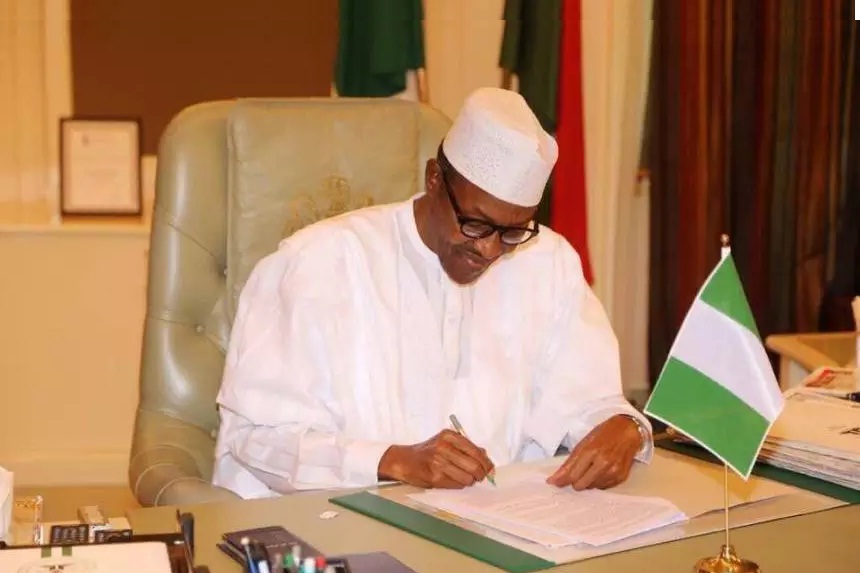
Muhammadu Buhar President of Nigeria
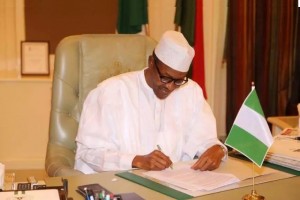
President of Nigeria
A former deputy governor of Central Bank of Nigeria (CBN), Kingsley Moghalu, has picked holes in President Muhammadu Buhari’s war against corruption, warning that the president’s fixation on stemming fraud in the country may hamper economic growth.
He advised that the government’s attention should also be on economic development of the nation.
In an opinion article sent to PREMIUM TIMES, the former bank regulator said President Buhari should not give priority to past events against the future of the country.
Mr. Moghalu, who is currently a professor of Practice in International Business and Public Policy at Tufts University’s Fletcher School of Law and Diplomacy in Massachusetts, USA, said, “Buhari has zeroed in (so far) on combating corruption and recovering stolen funds, on the one hand, and preparing to give Boko Haram a bloody nose, on the other” without building a solid foundation for the nation’s economic wellbeing.
Although he stressed the importance of fighting corruption and Boko Haram, he however called on the president to strike a balance between the fight against the twin malady and building the nation’s economy.
Mr. Moghalu said the emphasis should also be on “how can industrial policy help Nigeria achieve economic complexity and how can we build the ‘productive knowledge’ that is a sine qua non for complexity?
“How can the combination of a real industrial manufacturing economy, which is what determines the real value of a country’s exchange rate, combine with fiscal policy to incentivize a monetary policy that creates access to real capital at affordable prices? In other words, how can we put capital into our capitalism?”
The former banker said although there is no contention about the importance of security or combating corruption, but the task of building the future is also of paramount importance.
“But there is some dissonance on the matter of the balance between focusing heavily on probing and punishing past corruption and the task of constructing a future that can take us from being a poor country to a truly wealthy one, from a physical country to a real nation with a common goal and destiny. What is the balance between facing the past and building the future?” he asked.
Mr. Moghalu cautioned that once Mr. Buhari deals with “certain categories of past crimes (as opposed to present crimes) such as war crimes or governmental corruption, it all becomes political and prone (rightly or wrongly) to perceptions of selectivity.”
Giving copious examples to bolster his argument, Mr. Moghalu explained that there is corruption in many Asian countries but they look beyond it for economic prosperity.
“In China, Deng Xiaoping began a period of stunning economic transformation in the late 1970s which fundamentally altered China’s communist state to a capitalist one, unleashing the latent productivity of over one billion Chinese. This was a fundamental redesign of the basics on which modern China was established in 1949 by Mao Zedung after a debilitating civil war. Today, China is the world’s second largest economy, set to overtake the United States as the largest in the next two decades. Corruption has risen, along with China’s meteoric ascent, but President Xi Jin Ping is fighting back, with success. But wide scale corruption has not stopped China’s rise, even as it is rightly considered a strategic threat. Why? Because 400 million Chinese have been lifted out of poverty in the past three decades.
“Malaysia, with 27 million people is a rising emerging market that, in the early 1960s was well behind Nigeria in terms of economic prospects. Today it is a newly industrialized country with a GDP per capita of $11,000 (compared with Nigeria’s $3,000), foreign reserves of $100 billion, and a sovereign wealth fund with $41 billion in assets.
“In 1991, then Malaysian Prime Minister Mahathir bin Mohammed set a Vision 2020 BHAG in which his country would achieve the status of a self-sufficient industrialized nation by that date. That target has since been met. Manufacturing accounts for 40 per cent of GDP, and Malaysia is the 14h most competitive economy in the world, ahead of Australia, UK, South Korea and Japan in competitiveness. Meanwhile, what about corruption in Malaysia? It hasn’t disappeared, but strong institutions confront the menace. As I write, a special task force is investigating allegations that Malaysia’s current Prime Minister Najib Razak received $700 million from a state investment fund into his personal bank account.
“The point from these examples is that facing forward and building our future successfully will take more effort than facing the past,” he explained.
SOURCE: PREMIUMTIMES

